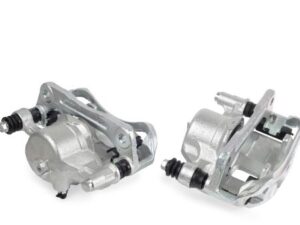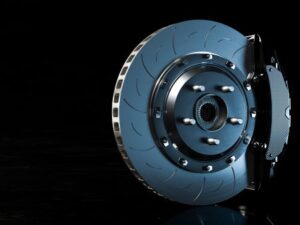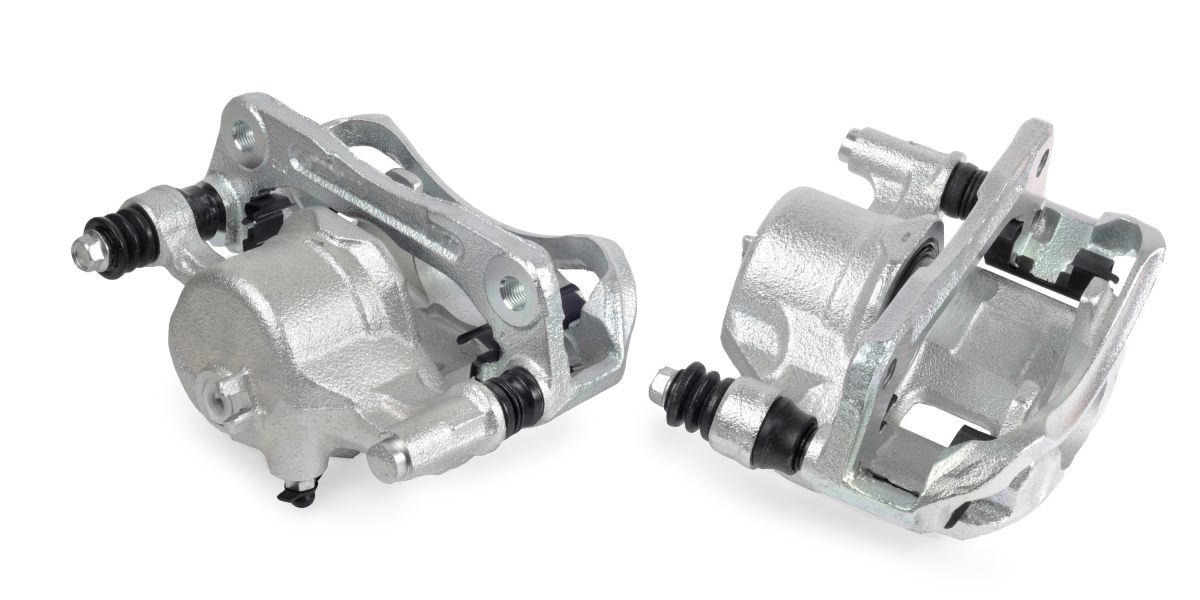What Does the Brake Caliper Do?

Having brake caliper problems? To understand the function of a brake caliper, motorists first need to understand how their vehicle’s disc brakes work. When motorists press the brake pedal with their foot, the vehicle turns kinetic energy (the car’s wheels rotating) into heat energy (by way of friction). Press on the brake pedal, then the brake booster amplifies that force.
Then, the brake booster transmits the force to a piston inside of the master cylinder, which forces brake fluid out of itself into the brake lines that go to each wheel. The brake fluid then activates the brakes, forcing the brake caliper to squeeze the disc and slow the vehicle. The brake caliper squeezes the brake pads in toward the metal disc until the vehicle slows.
Want more information about brake pads & shoes? Rotors & drums? Visit our Brake Repair page to learn more about your vehicle’s brake system and what we can do to help when you need repairs.
Five Signs You Need Brake Caliper Repair
Unlike brake pads, which wear out over time with normal use, brake calipers are supposed to last the life of the vehicle. However, sometimes that doesn’t happen. If the brake caliper fails, the brake pads wear out faster than normal.
1. Vehicle Pulls To One Side When Driving or Braking
Does the car seem to pull or steer to one side while the vehicle is in operation? The brake caliper contains pistons that move in and out due to hydraulic pressure from the master cylinder. If the pistons freeze up due to debris or corrosion, the brake pads will either fail to release the rotor or fail to come into contact with the rotor. In the first case, the car will pull toward the side where the damaged caliper is. If the brake pad fails to come into contact with the rotor, the vehicle will pull away from the damaged side. This can happen when the brakes are applied or during normal operation.
2. High-Pitched Squealing or Metalic Rubbing Noises
Another symptom of a sticking or frozen brake caliper is a noise emanating from the damaged part. This sound, if it’s due to the brake calipers and not the brake pads, will occur during driving, while brake pad issues will cause a noise when the driver applies the brakes. Make sure to take the vehicle into an auto repair shop as soon as possible, as a frozen or stuck caliper can eventually cause the brakes to lock up completely.
3. Brake Pads Unevenly Wear Down
If it seems that the brake pads on one side of the vehicle are thinner than the other side, it’s possible that the brake caliper is at fault. Take the vehicle into an auto repair shop and have a trained technician take a look at the problem.
4. Leaking Brake Fluid On the Ground Inside the Tires
Modern brake systems use hydraulic pressure to operate. If the caliper leaks, drivers may notice an oily spot on the ground inside the tire. However, this may not be the caliper at all. Consult with a trained technician to properly diagnose and repair the problem.
5. Clunking Sound
This symptom is much less common than the others, but it’s possible that the bracket that holds the brake caliper in place is faulty. In these cases, the broken bracket causes a loud clunking sound while operation. If this happens, do not drive the vehicle. The brakes could lock up completely which puts the driver and other motorists at risk for serious injury. Take the vehicle into an auto repair shop such as Ron’s Auto & RV in Vancouver, WA.
If your vehicle shows any of these signs of brake caliper problems, bring it into Ron’s Auto & RV for proper diagnosis and repair!
What Causes Brake Caliper To Stick?
The above symptoms indicate a stuck or faulty brake caliper. However, what causes the brake caliper to stick in these situations?
Caliper Slides

The brake caliper has grooves that hold the brake pads. The brake pads slide in when the driver pushes down on the brake pedal, and they slide out when the driver lets off the brake. If the brake pads stick in the grooves, drivers may experience difficulty stopping. The brake pads can get stuck due to debris, but if cleaning out the grooves doesn’t solve the problem, it’s possible that the grooves themselves will wear down. If this is the case, the calipers may need a complete replacement.
Caliper Bolts
The brake caliper bolts also have slides. The slides have rubber boots on them to keep them well lubricated. However, sometimes the rubber boots tear, which causes the bolts to dry out. If this happens, the brakes may stick. Have a licensed technician take a look at the brake assembly to determine whether the bolts need reconditioning or replacement.
Caliper Piston
The caliper piston may be the culprit. Like the bolts, the caliper piston has a rubber boot around it meant to protect and lubricate it. If the rubber boot tears, then rust and other debris slowly build up inside of the piston. In this case, the brake caliper may stick. If this is the problem, it’s likely that the whole brake caliper assembly needs replacement.
Brake Hose
Sometimes a vehicle’s brake hose wears out. If this happens, it’s possible that brake fluid will only flow one way, causing the brake pads to slow the vehicle. However, when the driver doesn’t apply the brakes, the fluid cannot flow the opposite way, resulting in a stuck caliper. This problem is difficult to diagnose, but an experienced professional should be able to isolate the problem with the brake caliper.
How To Avoid a Stuck Brake Caliper
Take care of the vehicle’s brakes. Make sure to replace the brake pads and top up the brake fluid when needed. Make sure to bring the vehicle into an auto repair shop if problems with the brake caliper come up.
How Can Ron’s Auto & RV Help?
Ron’s Auto & RV is a family-owned and operated ASE-Certified Auto Repair Shop. Since 1976, owner Ron Ferguson and his family have provided the city of Vancouver, WA, with high-quality auto and RV services. Call today to book an appointment!


